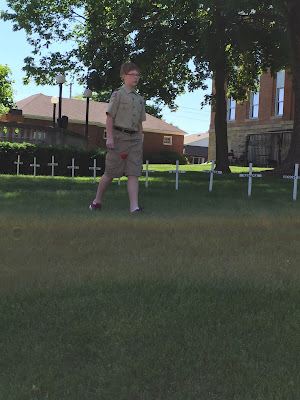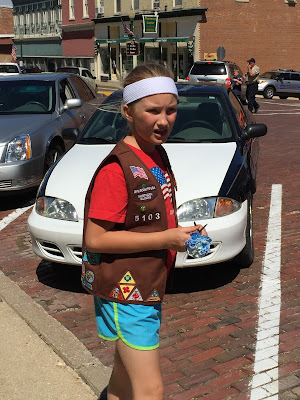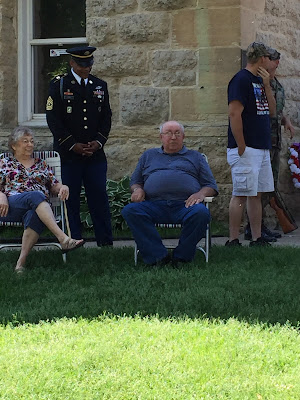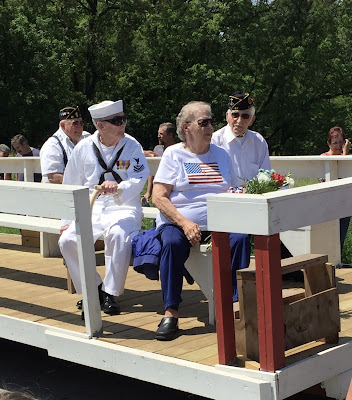FADE IN:
INT. ROW OF SEATS IN THEATRICAL PLAYHOUSE, NEAR STAGE - EVENING
In a playhouse in rural northwest Illinois, an attractive couple sits, reading playbills, waiting for onset of play, when another couple enters and takes adjacent seats.
DERF and his wife, LLENAR, nicely ensconced, full-time Privatopians are approached by GOOCH and his wife, LILY, full-time Privatopians, who “winter” in Florida.
GOOCH
Hey, Llenar and Derf! Fancy meeting you here.
DERF
I was thinking the same thing.
(The wives talk quietly to each other.)
GOOCH
Say, you’re not in favor of that new lodge, are you? …I mean, what are they thinking?!
***
I haven’t been blogging lately, and not because I don’t have anything to write. Rather, I am so chock-full of stuff that I’m afraid if I don’t stem the swell I will burst like an ill-maintained dam.
***
Where do I begin? To me it seems as if, currently, here in the USA, political divisiveness is as pervasive as it was during the civil war era. But, then I think about the recent UK referendum - on whether to leave or remain in the European Union... OR, the big debate here at Privatopia: Tear it Down and Rebuild or, The Old Lodge is Just Fine. Perhaps it’s just part of our collective tribal DNA to disagree…
***
Did you ever read the short book, “Mama’s Bank Account” by Kathryn Forbes? If not, perhaps you saw the play or film, “I Remember Mama” or, “Mama,” the television series.
It describes the joys and struggles of a Norwegian family in America in the 1910s. Each payday Mama gathers the family to see if there is sufficient cash for the family’s needs and thus no reason to go to the real “bank” in town to withdraw from their savings account.
"It will cost a little money,” says the son, Nels, as he expresses his desire to further his education by attending high school.
Nels had it all written out neatly. So much for carfare, for clothes, for notebooks and supplies. Mama looked at the figures for a long time. Then she counted out the money in the Little Bank. There was not enough. She pursed her lips. 'We do not,' she reminded us gently, 'want to have to go to the Bank.' We all shook our heads.' I will work in Dillon's grocery shop after school,' Nels volunteered. Mama gave him a bright smile and laboriously wrote down a sum and added and subtracted. Papa did it in his head. He was very quick on arithmetic. 'Is not enough,' he said. Then he took his pipe out of his mouth and looked at it for a long time. 'I give up tobacco,' he said suddenly. Mama reached across the table and touched Papa's sleeve, but she didn't say anything. Just wrote down another figure.' I will mind the Elvington children every Friday night,' I said. 'Christine can help me.'' Is good,' Mama said. We all felt very good. We had passed another milestone without having to go downtown and draw money out of Mama's Bank Account. The Little Bank was sufficient for the present."
It’s a heartwarming tale with a cute twist - (SPOILER ALERT!! - Actually, there is no downtown bank account. Mama has never set foot inside a bank. She used her weekly ritual to instill the idea of family responsibility and cooperation as to financial matters, to basically make certain that all were on the same page, -and, mind you, without unnecessary worry for the little ones.)
***
Privatopia is a common-interest community — governed by a property owners association (POA.)
Some property/home owners like having a governing body that instills balance and coherence within a locality by establishing rules that regulate its appearance and its use for the benefit of all. (I fall into that category.)
Often POAs/HOAs are governed by volunteer or elected board members. I thank them and applaud their service. However, sometimes members having little, or no, property management experience are then charged with the maintenance and allocation of hundreds of thousands of dollars. They make decisions such as paying down debt, building emergency or reserve funds. Reserves, as I understand it, are for items you know will have to be replaced or repaired, such as common roads, common building roofs, swimming pool/recreation areas, etc. How well should reserves funded? I don’t know. Rather than get involved, I put my trust in our board.
Logic dictates that the financial health of an POA community...
Let me stop right here- I can tell I’m losing your interest. But, do let’s talk for a minute about “logic."
Logic, as I recall being taught by Mr. Reardon in high school, centers around premises, which lead to a conclusion. It gets more complicated, but I’ll keep it basic.
Example of a logical conclusion:
All humans are mortal. (premise)
Ranell is a human. (premise)
___________________
So, Ranell is mortal. (conclusion)
Example of a counterexample in logic:
Ranell has never received a moving violation while driving a motorized vehicle. (true premise)
Ranell has been driving for 45+ years. (true premise)
_______________________
So, Ranell is a great driver. (invalid conclusion)
While the premises are true, it does not necessarily follow that the conclusion is true. Ranell could simply be lucky or skillful at eluding tickets.
Example of false premise, false conclusion
All stars emit light. (true premise)
Mars is a star. (false premise - Mars is not a star, but a planet)
___________________
So, Mars emits light. (invalid conclusion)
Now, back to Privatopia and our POA Board’s attempt to obtain approval for the demolition and rebuilding of our 40-year-old lodge building. I took a good look at the lodge recently and didn’t think it looked all that bad. Nor, do I consider 40 years to be too old for a building. Heck, Practical Husband and I resided in a Chicago bungalow that was about 77 years old when we sold it to a young man who adored it. And then I think about how the National Park Service works to preserve old lodges and historical buildings. Instead of demolition they opt to upgrade the building's HVAC systems, electrical and plumbing.
The board took pictures of some of the “problem” areas and posted them, e.g., an open electrical junction box. This sort of backfired because of numerous reactions, like: “Why aren’t we fixing these things as we go along?” “Somebody take a screwdriver and close the darn thing!” Anyway none of the problems seemed insurmountable, something to justify razing the building. But, that’s me.
Here is their opening paragraph about the New Lodge (the italics are mine, to accent the parts I question):
The goal with this project is to create value for our property owners - a new four season, family oriented facility that will better support the pool and winter activities. This will attract younger families with kids. The plan is to build an attractive more functional facility that better connects to the pool with a central entry point. It will better support current and new activities. Better facilities for dinners, dances, weddings, movies, kid’s and young adult activities, fitness center, meetings, card clubs, ski hill, tube hill, and more. Having a first rate facility for these activities will help to attract new membership and increase property values. This is consistent with our Lake Carroll Mission Statement. Quality amenities including lake, golf, clubhouse, pool, and including a new lodge will only help to attract membership and improve property values. We need to invest in our future.
I don’t follow their logic. Let’s start with that 2nd sentence: “This will attract younger families with kids.” -Where is the proof for this statement? And even if this were a true premise or conclusion, from where will these young families come? The Chicago suburbs? From the sometimes, economically challenged local small towns of northwest Illinois? Are they talking about families relocating completely or families buying second, weekend getaway homes? In which case they might have to wait for the economy to improve. And if it improves to the point that young families can afford 2nd homes, might they just might move here even without a new lodge?
Next: "build an attractive more functional facility that better connects to the pool with a central entry point” -Do you need to demolish an entire building? Can’t we just add a central entry point to connect the two buildings?
Next: "It will better support current and new activities. Better facilities for dinners, dances, weddings, movies, kid’s and young adult activities, fitness center, meetings, card clubs, ski hill, tube hill, and more.” -But, we have all of the above listed activities now. So what are the “new” or the “and more?” And please tell me you aren’t hoping to attract teenagers with foosball and Nintendo?!
Next: "Having a first rate facility for these activities will help to attract new membership and increase property values.” and "a new lodge will only help to attract membership and improve property values. We need to invest in our future.” - I know, it gets repetitious, right? But when you only have one talking point, I guess you just keep repeating it.
Now, here is my stab at logic:
Most children go to school 5 days per week for much of the winter.
Many children participate in extracurricular activities, such as sports, arts and science.
Many extracurricular activities, like sports, arts and science require weekday and weekend participation.
____________________________
So, most school children will have little time to use a building designed primarily for winter use, outside of a few weekends.
Are we to build a new lodge so that young families (who have not bought, nor moved here yet and thus actually do not exist) can use it two days per week, if that? We already have a restaurant that is only open 3 1/2 days during the academic year.
Beaver, do you want to go to Privatopia this weekend?
Golly jeepers, Mom, you know it’s the big game at school. And I promised the guys. Besides, what are we going to do there? Sit in the new lodge and play foosball or Nintendo? I can do that at home.
Here is another paragraph from our Board:
This is all about a long term investment in our future that will create value for our membership. Interest rates are at historic lows and will likely go up in the future. Construction costs go up 3 to 4% a year. It will only get more expensive to build as years go by. -Sounds rather like a timeshare pitch or used car sale, doesn’t it?
We have just what you are looking for in a brand new lodge -the latest in architectural engineering improvements -longer lasting -easy servicing -fun to use -plenty of room -prices start at just $4,150,000, delivered! -satisfaction guaranteed or your money back (if only!)
The board also tried to put this “it won’t cost you one cent" spin on it, by saying that instead of lowering the annual POA fee by $136, as promised, now that the prior loan has been repaid, they will keep those monies in the annual assessment and use it to repay our brand, spanking new loan. Kind of like using the “pug dog” economics theory from “Life with Father.” Have you read the book or seen the movie? They have a great scene where Mrs. Day purchases a life-sized ceramic pug dog for $15 from a NY department store. When Mr. Day spots it he flips. “What is this monstrosity? Get rid of it!” Their son, Clarence, wants a new suit from the same store and it also costs $15. Mrs. Day lets Clarence exchange the pug dog for the suit of clothes.
The suit is delivered, and Mr. Day sees the package and questions its contents.
Mrs. Day: (explaining)It’s a new suit of clothes for Clarence, and it isn’t costing you a penny.
Mr. Day: (looking at the package) It’s marked 'charge -$15.' It’s costing me $15.
Mrs. Day: Clare, can’t you take my word? It isn’t costing you a penny.
Mr. Day: I’d like to have you explain why it isn’t.
Mrs. Day: Because Clarence took the pug dog back and got the suit instead.
Mr. Day: Of course, and they’ll charge me $15 for the suit.
Mrs. Day: Nonsense, Clare we gave them the pug dog for the suit. Don’t you see?
Mr. Day: Then they’ll charge me $15 for the pug dog.
Mrs. Day: But, Clare, they can’t. We haven’t got the pug dog. We sent that back.
Mr. Day: (stammering) But, hmm, but..., now wait a minute, Vinnie. There is something wrong with your reasoning.
Mrs. Day: Clare, I’m surprised at you. And you’re supposed to be so good at figures. Why it’s perfectly clear to me.
Mr. Day: Vinnie, they’re going to charge me for one thing or the other.
Mrs. Day: Don’t you let them!
Mr. Day: Well, McClearys aren’t giving away suits and they aren’t giving away pug dogs. Why it should be clear to a child that if Clarence sent the pug dog back they… (stammering again) hmm… well…
-at this point Mr. Day is so befuddled by his wife’s reasoning that he abruptly changes the subject.
I enjoy my POA community and I respect my Board. I have supported the Board's suggestions at each financial vote over the years. This time, however, I think they are wrong, and there's no shame in that. After all no one can always bat 1.000. If the vote goes through despite my opposition, that will be just fine. No hard feelings on my part. I will continue to respect my board, my community, pay my dues and follow the rules and regulations. $136 per year will not hurt me financially. I merely object to the demolition and replacement of a building that just needs a bit of TLC and some HVAC updating. And okay, perhaps some new furniture, some modern exercise equipment, and fine, fine! alright, a foosball, pool table and Nintendo. And you know, if we are going to focus on winter activities how about a nice ice skating rink or one of those fancy ice ribbons like they have at Maggie Daley Park in Chicago? Surely we can do all that for less than $4,150,00.00?
NOTE: As a side note on attracting teenagers and young adults, both Harvard and Yale have completed thorough studies about teen participation in out-of-school activities. You can look them up on line, OR take my word that basically due to uber-busy schedules including, part-time jobs, sports, arts and other extracurricular activities, to say nothing of school and homework, paid or volunteer internships, teens today have little time for hanging out at Privatopia-like havens. Teens who do have rare free time often prefer to hang out and have a pick-up basketball game or to go shopping with their friends. The desire to have parental or adult supervision plummets around the age 15 or 16. Having activities or gatherings with older adults around isn’t very appealing to teens and young adults. Surprise! Surprise!
Alas, such is the nature of teenagers. Privatopia should know this from the following report on a social event that resulted in the arrest of several teens:
Minors arrested at drinking party
Carroll County Sheriff’s deputies and other agencies responded at 1:10 a.m. Saturday to a report of drinking party in the area of Pronghorn Court and Fawn Ridge Drive.
Eleven people from 18 to 20 years and four juveniles from 15 to 17 years, were taken to the sheriff’s department for processing. Two of the 11 were wanted on Stephenson County warrants; they posted bond and were released. Another one of the 11 was charged with obstruction of identification. He posted bond and was released.
A search warrant was carried out at the home, and 30 more minors were found inside. All were processed and released to responsible parties, and all will receive notice to appear in court for consumption of alcoholic liquor as a minor.
Chadwick, Lanark, Mount Carroll, and Savanna police, along with state troopers, state Department of Natural Resources police, Lake Carroll security, and the Carroll County State’s Attorney’s office assisted at the scene.
 |
| Is there any winter activity more wholesome than ice skating? |




























